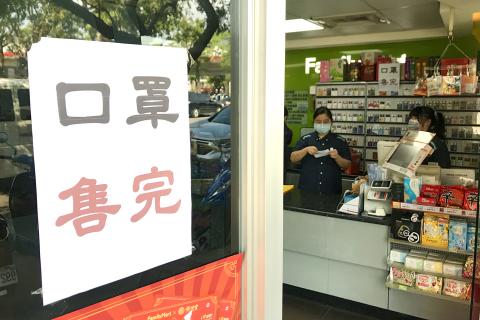The government plans to purchase 4 million masks a day to ensure continued supply and availability of masks during heightened alert over the spread of the 2019 novel coronavirus (2019-nCoV), Executive Yuan spokeswoman Kolas Yotaka said yesterday.
The Centers for Disease Control (CDC) on Tuesday announced that it would be releasing 6 million masks a day onto the market for three consecutive days.
However, that measure was insufficient, as there was still a shortage of masks yesterday.

Photo: CNA
The Ministry of Health and Welfare yesterday said that between Wednesday last week and Wednesday, more than 19.7 million masks were distributed to the nation’s four major convenience store chains, as well as pharmacies.
In addition to purchasing 4 million masks a day, the Ministry of Economic Affairs would also be supplying health ministry staff with masks, Kolas said.
The government has imposed a standard price on masks — NT$8 (US$0.26) per pack of three — to prevent stores or individuals from driving up prices, Kolas added.
The economics ministry is also investigating ways to step up the production of masks from 4 million to 6 million a day, she said.
Deputy Minister of Health and Welfare Ho Chi-kung (何啟功) said that the ministry is monitoring the number of mask sales.
“Continued difficulty in obtaining masks could lead to the ministry establishing a logistics platform and a task force,” Ho said.
Meanwhile, the Consumer Protection Committee warned that anyone found guilty of driving up the prices of masks could face a fine or be subject to imprisonment.
Citing Article 251 of the Criminal Code, the committee said that intentionally inflating the price or stockpiling masks could be penalized with up to three years of imprisonment, as well as a NT$300,000 fine.
The practices could also contravene the Fair Trade Act (公平交易法), resulting in fines of NT$50,000 to NT$25 million, the committee said.
The committee is inspecting distributors of masks, to observe demand and whether there are any incidents of prices being inflated.
Additional reporting by CNA

INVESTIGATION: The case is the latest instance of a DPP figure being implicated in an espionage network accused of allegedly leaking information to Chinese intelligence Democratic Progressive Party (DPP) member Ho Jen-chieh (何仁傑) was detained and held incommunicado yesterday on suspicion of spying for China during his tenure as assistant to then-minister of foreign affairs Joseph Wu (吳釗燮). The Taipei District Prosecutors’ Office said Ho was implicated during its investigation into alleged spying activities by former Presidential Office consultant Wu Shang-yu (吳尚雨). Prosecutors said there is reason to believe Ho breached the National Security Act (國家安全法) by leaking classified Ministry of Foreign Affairs information to Chinese intelligence. Following interrogation, prosecutors petitioned the Taipei District Court to detain Ho, citing concerns over potential collusion or tampering of evidence. The

‘FORM OF PROTEST’: The German Institute Taipei said it was ‘shocked’ to see Nazi symbolism used in connection with political aims as it condemned the incident Sung Chien-liang (宋建樑), who led efforts to recall Democratic Progressive Party (DPP) Legislator Lee Kun-cheng (李坤城), was released on bail of NT$80,000 yesterday amid an outcry over a Nazi armband he wore to questioning the night before. Sung arrived at the New Taipei City District Prosecutors’ Office for questioning in a recall petition forgery case on Tuesday night wearing a red armband bearing a swastika, carrying a copy of Adolf Hitler’s Mein Kampf and giving a Nazi salute. Sung left the building at 1:15am without the armband and apparently covering the book with a coat. This is a serious international scandal and Chinese

Seventy percent of middle and elementary schools now conduct English classes entirely in English, the Ministry of Education said, as it encourages schools nationwide to adopt this practice Minister of Education (MOE) Cheng Ying-yao (鄭英耀) is scheduled to present a report on the government’s bilingual education policy to the Legislative Yuan’s Education and Culture Committee today. The report would outline strategies aimed at expanding access to education, reducing regional disparities and improving talent cultivation. Implementation of bilingual education policies has varied across local governments, occasionally drawing public criticism. For example, some schools have required teachers of non-English subjects to pass English proficiency

TRADE: The premier pledged safeguards on ‘Made in Taiwan’ labeling, anti-dumping measures and stricter export controls to strengthen its position in trade talks Products labeled “made in Taiwan” must be genuinely made in Taiwan, Premier Cho Jung-tai (卓榮泰) said yesterday, vowing to enforce strict safeguards against “origin laundering” and initiate anti-dumping investigations to prevent China dumping its products in Taiwan. Cho made the remarks in a discussion session with representatives from industries in Kaohsiung. In response to the US government’s recent announcement of “reciprocal” tariffs on its trading partners, President William Lai (賴清德) and Cho last week began a series of consultations with industry leaders nationwide to gather feedback and address concerns. Taiwanese and US officials held a videoconference on Friday evening to discuss the